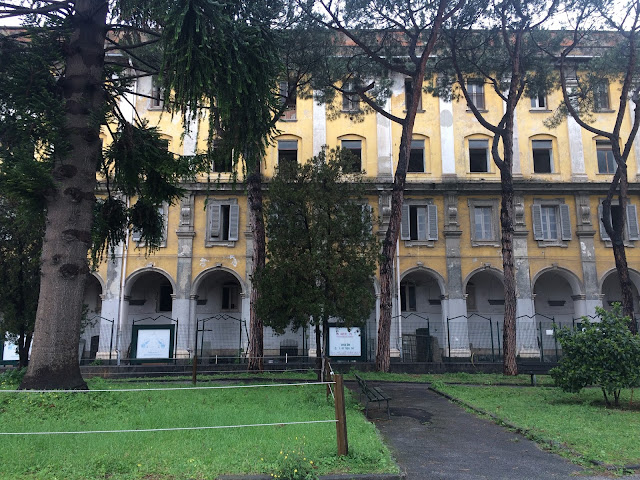It is the mode de rigueur in the current urban agenda: communitarnism, and localism. But how can a community oriented 'co-planning' system really work? What options do we have? On the ground in Naples and London, we explore.
 |
How to wake-up a sleeping giant. The ex-military hospital in Naples, Italy.
No small feat. |
Embedded with opportunity, and latent agency for change, modes of community engagement have been the focus both in the UK, and in Europe. Their comparison reveals both challenges, but both speak to the optimism that can be harnessed - but what are the potential pitfalls, and what debates need to be had in order to truly create meaningful regeneration. The URBACT 2nd Chance network is an ambitious, Euro-centric, initiative that provides a system in which groups can take ownership over old civic (and commercial) buildings; bringing a second life to these 'giants' that sit in quiet disrepair. Waking up these 'sleeping giants' which shadow our cities. Through their re-birth, they readdress their value within cities by drawing in the local community to say how and what these buildings will transform into, and the life they will now lead. It sits within an ideological framework of community led decision making - the land of post-it notes, coloured pens, and the generous (if available) spirit of residents. In Naples an ex-Military Hospital is being adapted. Here, the architects and engineers speak of a highly intricate process of developing a strategic vision and program of uses for its next incarnation. The site's physical location is a key part of what the designers suggest will critically bridge between the adjoining communities, and create an important green space for the residents of the city. It speaks to an approach of 'bottom up', community visioning, and volunteer informality. The results sees a detailed plan of program and use, however large questions around their management and budgets, both capital and operational, remain the point of strategic vagueness. At this 'sleeping giant' - the scale speaks of a huge monetary investment. This largely stays unanswered throughout the presentations by the design team, and becomes tangibly manifested when walking the hospital's beautiful but disused grounds, and its sprawling built forms.
[...presenting clear advantages to empower community engagement at a statutory level, limitations on this mode also risks a form of 'contribution inequality'...]
In contrast, the UK model of community empowerment - off the back of London's Neighbourhood Planning - focuses on community participation, with a legislated right, in the craft of the local borough planning documents. Whilst well intended, and presenting clear advantages to the empowerment of community engagement at a statutory level, limitations on this mode also risks a form of 'contribution inequality' - whereby those with time and means (and often technical skill) to dedicate to such voluntary groups, may risk a skewed community input and thus potentially exacerbating inequalities by incident. What then does this suggest, is a provocation for planners and governance structures to reassess how to truly engage with their communities. Namely to consider the various factors larger inputs upon a resident's capacity to engage with such potentially powerful community tools.
It thereby becomes a communication challenge on the part of those in technical, governance, and development roles, to reassess how to take ownership of designing for community consultation and empowerment - by understanding the limitations but also latent opportunity that is availed through community input. Our partners in Naples show the necessity to bring aspirations in line with business acumen, to develop community and financial, and governance partnerships to ensure such energy and wealth of ideas (and post-it notes) are realised.
 |
| On-site briefing to city design scholars from the London School of Economics. Naples, Italy. |
 |
| How post-it notes can save the world: detail of community visioning in Naples, Italy. |





Comments
Post a Comment